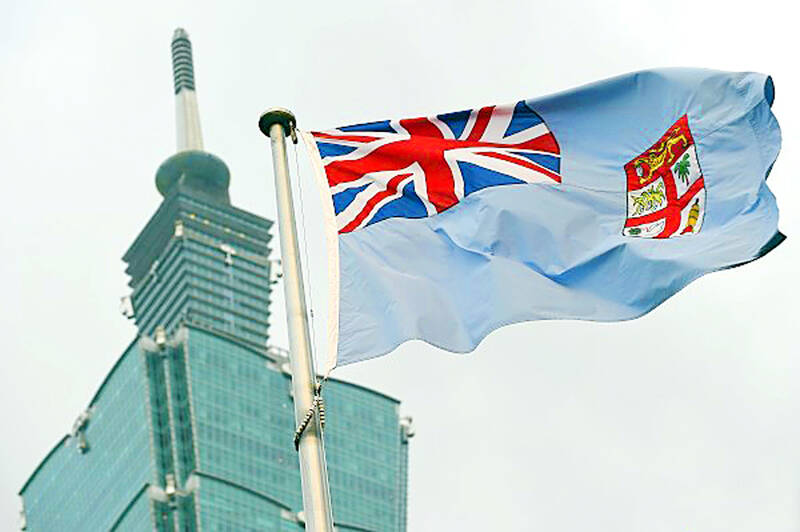The Taipei Trade Office in Fiji has been restored to its former name, the Trade Mission of the Republic of China (Taiwan) to the Republic of Fiji, the Ministry of Foreign Affairs said yesterday.
Fiji on Friday last week issued a note verbale to the office saying that the name change was retroactively effective from March 15, Department of East Asian and Pacific Affairs Director-General Wallace Chow (周民淦) told a news conference in Taipei.
The mission’s diplomatic privileges have been reinstated as stipulated in Fiji’s Diplomatic Privileges and Immunities Act, which was enacted in 1971, Chow said.

Photo: Chen Chih-chu, Taipei Times
Taiwan set up a trade mission in Fiji in 1971, which was closed and replaced by the East Asia Trade Center in 1976, a year after China and Fiji established diplomatic relations.
The East Asia Trade Center was renamed the Trade Mission of the Republic of China (Taiwan) to the Republic of Fiji in 1988, before Beijing pressured Fiji to change it to the Taipei Trade Office in Fiji in 2018 and to revoke the privileges of Taiwanese diplomats.
Taiwan typically uses the term “Taipei” instead of its official name “Republic of China (Taiwan)” when naming its de facto embassies in most nations, mainly because the host nation adheres to Beijing’s “one China” principle.
After the Fijian general elections in December last year, pro-democratic opposition parties the People’s Alliance Party, the National Federation Party and the Social Democratic Liberal Party formed a coalition and overruled the name change imposed by the former government, Chow said.
The new government acknowledges Taiwan’s contributions in the fields of agriculture, fisheries, medical care and education, which have benefited the people of Fiji since Taiwan established its representative office in 1971, he said.
The ministry thanked Fiji for its decision, adding that Fiji is a like-minded partner in the Pacific region and Taiwan would continue to boost its ties with the nation.
Although China has so far made no comment on the change, “it might react quite aggressively,” Chow said.
Asked whether the move indicates that Fiji has the intention to have simultaneous diplomatic relations with Taiwan and China, he said that the ministry does not exclude the possibility and it would deliberate on any proposal to expand Fiji’s economic and trade space with Taiwan.
Fiji closed its representative office in Taipei in 2017, reportedly due to a need to make better use of its resources and not because of pressure from China.
A diplomatic source told the Central News Agency (CNA) that the new Fijian government, which is more friendly toward Taiwan, has been in talks to reopen the office in Taipei.
Despite the lack of official diplomatic ties with Taiwan, Fijian leaders have visited Taiwan and even spoken up for Taiwan’s international participation on several occasions, CNA cited the source as saying.
Additional reporting by CNA

Intelligence agents have recorded 510,000 instances of “controversial information” being spread online by the Chinese Communist Party (CCP) so far this year, the National Security Bureau (NSB) said in a report yesterday, as it warned of artificial intelligence (AI) being employed to generate destabilizing misinformation. The bureau submitted a written report to the Legislative Yuan in preparation for National Security Bureau Director-General Tsai Ming-yen’s (蔡明彥) appearance before the Foreign Affairs and National Defense Committee today. The CCP has been using cognitive warfare to divide Taiwanese society by commenting on controversial issues such as Taiwan Semiconductor Manufacturing Co’s (TSMC, 台積電) investments in the

INVESTIGATION: The case is the latest instance of a DPP figure being implicated in an espionage network accused of allegedly leaking information to Chinese intelligence Democratic Progressive Party (DPP) member Ho Jen-chieh (何仁傑) was detained and held incommunicado yesterday on suspicion of spying for China during his tenure as assistant to then-minister of foreign affairs Joseph Wu (吳釗燮). The Taipei District Prosecutors’ Office said Ho was implicated during its investigation into alleged spying activities by former Presidential Office consultant Wu Shang-yu (吳尚雨). Prosecutors said there is reason to believe Ho breached the National Security Act (國家安全法) by leaking classified Ministry of Foreign Affairs information to Chinese intelligence. Following interrogation, prosecutors petitioned the Taipei District Court to detain Ho, citing concerns over potential collusion or tampering of evidence. The

‘COMPREHENSIVE PLAN’: Lin Chia-lung said that the government was ready to talk about a variety of issues, including investment in and purchases from the US The National Stabilization Fund (NSF) yesterday announced that it would step in to staunch stock market losses for the ninth time in the nation’s history. An NSF board meeting, originally scheduled for Monday next week, was moved to yesterday after stocks plummeted in the wake of US President Donald Trump’s announcement of 32 percent tariffs on Taiwan on Wednesday last week. Board members voted to support the stock market with the NT$500 billion (US$15.15 billion) fund, with injections of funds to begin as soon as today. The NSF in 2000 injected NT$120 billion to stabilize stocks, the most ever. The lowest amount it

NEGOTIATIONS: Taiwan has good relations with Washington and the outlook for the negotiations looks promising, Minister of Economic Affairs J.W. Kuo said Taiwan’s GDP growth this year is expected to decrease by 0.43 to 1.61 percentage points due to the effects of US tariffs, National Development Council (NDC) Minister Paul Liu (劉鏡清) said at a meeting of the legislature’s Economics Committee in Taipei yesterday, citing a preliminary estimate by a private research institution. Taiwan’s economy would be significantly affected by the 32 percent “reciprocal” tariffs slapped by the US, which took effect yesterday, Liu said, adding that GDP growth could fall below 3 percent and potentially even dip below 2 percent to 1.53 percent this year. The council has commissioned another institution